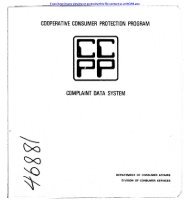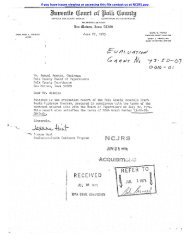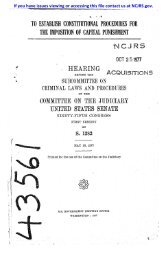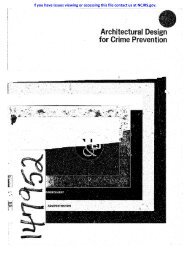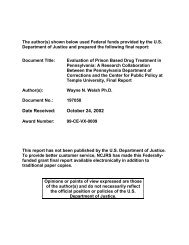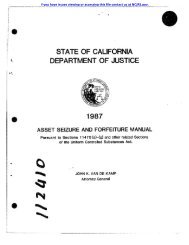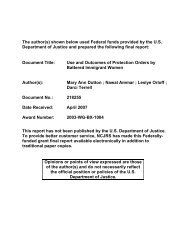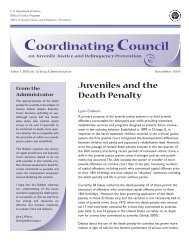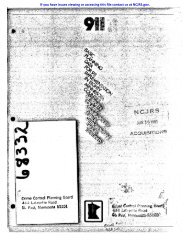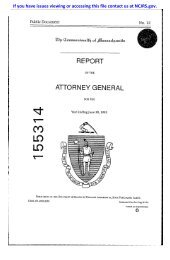Conflict Resolution Education - National Criminal Justice Reference ...
Conflict Resolution Education - National Criminal Justice Reference ...
Conflict Resolution Education - National Criminal Justice Reference ...
You also want an ePaper? Increase the reach of your titles
YUMPU automatically turns print PDFs into web optimized ePapers that Google loves.
say, “My dad says if somebody hits me, I can hit<br />
them back.” By incorporating parents into the<br />
whole-school project, schools provide youth and<br />
parents with effective alternatives for dealing with<br />
conflicts peacefully on school grounds and at home.<br />
Parents are encouraged to become involved in a<br />
variety of ways. They can begin by creating a core<br />
committee—a planning and implementation team<br />
comprising teachers, counselors, administrators,<br />
students, and parents. Based on the needs of the<br />
school, the committee develops an action plan and<br />
timeline and oversees the project. Depending on<br />
the parents’ time and availability, they can help by<br />
participating in outreach and publicity, training<br />
new student mediators, taking referrals, scheduling<br />
mediation sessions, keeping records, facilitating<br />
biweekly student mediator meetings, following up<br />
cases, and fundraising. Parents can perform some<br />
functions with limited training, but certain duties,<br />
such as training conflict managers and facilitating<br />
biweekly meetings, require intensive training. Parents<br />
may join teachers in a 2-day mediation training<br />
or attend a series of workshops introducing them to<br />
effective family communication and problem-solving<br />
skills for use in the home. Some schools create a<br />
parent support group to discuss concerns and participate<br />
in ongoing skills training and practice.<br />
Parents can assist schools in securing support for<br />
a whole-school conflict resolution project by presenting<br />
information at parent-teacher association<br />
meetings, student and/or parent assemblies, staff<br />
meetings, town meetings, and students’ classes. A<br />
well-informed parent group also serves as an important<br />
referral source. It can refer school-related<br />
conflicts to the peer mediation program and familyand<br />
community-related disputes to a community<br />
mediation program. CBP provides free outreach<br />
presentations to parent groups on methods for<br />
referring cases to the program.<br />
<strong>Conflict</strong> resolution is what I need and I won’t<br />
quit until all my friends know about it.<br />
Student, Funderburg Youth Program<br />
59<br />
The use of conflict management skills by<br />
everyone in our school community is the<br />
key component of our district’s efforts to<br />
become a multicultural organization.<br />
School superintendent,<br />
Ann Arbor, Michigan<br />
Partnerships Between School and Community<br />
Mediation Programs. Partnerships between schoolbased<br />
mediation programs and their communitybased<br />
counterparts strengthen and benefit both<br />
programs. The Community Board of San Francisco<br />
and the San Francisco Unified School District foster<br />
their strong relationship by using the following<br />
strategies:<br />
Sharing Mediators. Youth as young as age 14 are<br />
trained to become community mediators. If students<br />
are already trained as peer mediators in schools,<br />
they only need to participate in an orientation session<br />
to join the pool of community mediator volunteers.<br />
Such student mediator “sharing” provides<br />
important additional resources for the community<br />
mediation program. The youth involved learn valuable<br />
lessons about effective citizenry and advanced<br />
conflict resolution skills.<br />
Cross-Referral System. Even if a school has no<br />
peer mediation program, educators can benefit<br />
from understanding the sorts of disputes that might<br />
be referred to community mediation programs.<br />
These include serious incidents involving nonschool<br />
youth or a range of parent, educator, and community<br />
issues. Certain complex disputes may benefit<br />
from both school-based and community-based<br />
mediation sessions. Volunteer community mediators<br />
and “shared” student peer mediators perform outreach<br />
to schools by distributing fliers and making<br />
presentations.<br />
Parent-Child Mediation. Youth who may be having<br />
attendance or behavioral problems can benefit from<br />
a parent-child mediation session from the community<br />
mediation program. This service is especially<br />
useful for youth who are making the transition from<br />
special schools that deal with behavioral difficulties



